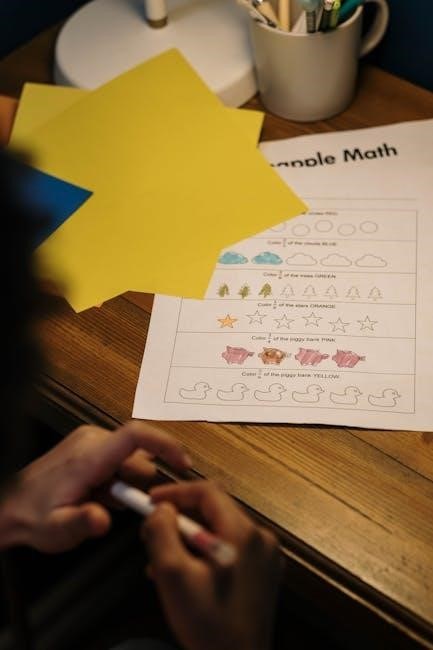
Dementia worksheets are specialized tools designed to support individuals with dementia through structured activities. These resources focus on cognitive stimulation, memory enhancement, and daily functioning, helping maintain mental acuity and provide a sense of accomplishment and purpose.
What Are Dementia Worksheets?
Dementia worksheets are specialized tools designed to support individuals with dementia through engaging and therapeutic activities. These resources typically include puzzles, memory aids, and communication exercises tailored to various cognitive levels. They aim to stimulate mental function, promote memory recall, and enhance daily living skills. Worksheets often incorporate visual and tactile elements to make activities more accessible and enjoyable. They are widely used by caregivers and healthcare professionals to provide structure, engagement, and a sense of accomplishment for individuals with dementia, adapting to their specific needs and abilities.
The Importance of Structured Activities for Dementia Patients
Structured activities are essential for dementia patients as they provide mental stimulation, emotional comfort, and a sense of purpose. These activities help maintain cognitive function, reduce agitation, and promote memory recall. By engaging in routine tasks, individuals with dementia can experience a sense of accomplishment and improved mood. Structured activities also support communication skills and daily living abilities, fostering independence and confidence. They play a critical role in enhancing overall well-being and quality of life for those living with dementia.

Benefits of Using Dementia Worksheets
Dementia worksheets offer numerous benefits, including mental stimulation, memory enhancement, and improved daily functioning. They foster a sense of purpose, boost mood, and support confidence in individuals with dementia.
Cognitive Stimulation and Memory Enhancement
Cognitive stimulation and memory enhancement are key focuses of dementia worksheets. These tools provide activities such as puzzles, memory games, and trivia to challenge the mind. By engaging in these exercises, individuals with dementia can maintain cognitive function and slow decline. Worksheets often include visual and tactile elements, like images or large-font text, to aid understanding. Regular use helps improve recall and problem-solving skills, fostering a sense of accomplishment and mental well-being. This structured approach supports brain health and enhances quality of life for those with dementia.
Improved Communication Skills
Dementia worksheets play a vital role in enhancing communication skills for individuals with dementia. These resources often include word games, picture matching, and conversation starters to encourage verbal and non-verbal interactions. By engaging in these activities, patients can maintain their ability to express thoughts and connect with others. Worksheets also provide visual cues, helping individuals with language difficulties communicate more effectively. Regular practice fosters confidence and strengthens relationships, making communication more meaningful and accessible for those with dementia.
Enhanced Daily Living Activities
Dementia worksheets can significantly improve daily living activities by providing structured tasks that promote independence and functionality. These tools often include schedules, checklists, and memory aids to help individuals manage routines, such as medication reminders or meal preparation. Visual cues and step-by-step guides assist with tasks that may become challenging, fostering a sense of accomplishment and reducing reliance on caregivers. By reinforcing practical skills, dementia worksheets help maintain independence and overall quality of life for individuals with cognitive impairments.

Types of Dementia Worksheets
Dementia worksheets vary widely, offering cognitive exercises, memory aids, communication activities, and practical skill-building tasks tailored to support individuals at different stages of cognitive decline effectively.
Cognitive Exercises and Puzzles
Cognitive exercises and puzzles are essential components of dementia worksheets, designed to stimulate mental function and slow cognitive decline. These activities include crossword puzzles, word searches, and memory games, which enhance concentration, memory recall, and problem-solving skills. They are tailored to various stages of dementia, with visual and tactile elements to aid engagement. Such exercises not only provide mental stimulation but also foster a sense of accomplishment, boosting confidence and overall well-being for individuals with dementia.

Memory Aids and Reminiscence Activities
Memory aids and reminiscence activities in dementia worksheets help individuals recall past experiences and emotions, fostering mental engagement and emotional well-being. These tools often include timelines, photo albums, or life story exercises, encouraging conversation and reflection. By focusing on familiar events or sensory elements like music or scents, these activities can stimulate long-term memory and provide comfort. Worksheets designed for reminiscence support social interaction and help maintain a sense of identity, proving invaluable for both patients and caregivers.
Communication and Language Exercises
Communication and language exercises in dementia worksheets are tailored to support verbal and non-verbal skills. These activities include word games, sentence completion, and picture matching to stimulate conversation and comprehension. They help individuals express thoughts and maintain language abilities, enhancing their ability to interact socially. These exercises are often combined with visual aids to facilitate understanding and engagement, proving beneficial for both patients and caregivers in fostering meaningful interactions and preserving communication abilities effectively.
Activities for Daily Living and Functional Skills
Dementia worksheets for daily living and functional skills focus on practical tasks to maintain independence. Activities include scheduling, budgeting, and self-care routines, helping individuals manage daily responsibilities. These exercises often incorporate visual aids and step-by-step guides to simplify complex tasks. By reinforcing these skills, worksheets enable individuals with dementia to retain autonomy and confidence in performing everyday activities, thereby improving their quality of life and reducing reliance on caregivers for routine tasks.

How to Create Effective Dementia Worksheets
Design worksheets with clear layouts, large text, and simple instructions. Incorporate visual aids and tactile elements to enhance engagement and cater to varying cognitive levels effectively.
Designing Clear and Simple Layouts
Creating effective dementia worksheets requires a focus on clarity and simplicity. Use large, readable fonts and short, concise sentences to ensure accessibility. Incorporate high-contrast colors and ample white space to avoid overwhelming the user. Images and visual cues can enhance understanding and engagement. Ensure instructions are straightforward, with minimal complexity. Consistent formatting across worksheets helps establish familiarity and routine. Avoid clutter or unnecessary elements that could cause confusion. By prioritizing simplicity, worksheets become more effective tools for cognitive stimulation and daily functioning.
Incorporating Visual and Tactile Elements
Visual and tactile elements in dementia worksheets enhance engagement and accessibility. Use high-contrast colors and large, clear images to aid memory recall and focus. Tactile activities, such as puzzles or touch-based exercises, stimulate sensory processing and motor skills. Combining visual cues with simple instructions can improve comprehension. Incorporating familiar objects or textures can evoke memories and emotions, fostering a sense of connection. These elements create a multisensory experience, making worksheets more effective for individuals with varying cognitive and sensory abilities.

Where to Find Dementia Worksheets PDF
Dementia worksheets in PDF format can be found on reputable websites like the Alzheimer’s Association, National Institute on Aging, and World Health Organization. Online platforms such as Google Scholar and educational databases also offer accessible resources. Additionally, checking university websites or healthcare provider resources can lead to valuable materials. Ensure sources are credible to maintain quality and safety.
Reputable Organizations and Websites
Reputable organizations like the Alzheimer’s Association, National Institute on Aging, and World Health Organization offer high-quality dementia worksheets in PDF format. These organizations provide evidence-based resources designed to support cognitive stimulation, memory enhancement, and daily living skills. Their materials are often tailored to meet the specific needs of individuals with dementia at various stages. Additionally, academic institutions and healthcare providers frequently share accessible worksheets through their websites. Always verify the credibility of the source to ensure the worksheets are safe, effective, and aligned with professional guidelines for dementia care.
Online Platforms and Resource Libraries
Online platforms and resource libraries provide accessible dementia worksheets in PDF format, catering to diverse needs. Websites like Google Scholar, ResearchGate, and academic databases offer peer-reviewed materials. Dedicated health platforms and caregiving forums also share downloadable resources; These libraries often include worksheets tailored to specific dementia stages, ensuring activities are appropriate and engaging. Users can explore a variety of tools, from cognitive exercises to daily living aids, all accessible with a simple search. These platforms are invaluable for caregivers and professionals seeking structured, effective resources for dementia support.

Best Practices for Using Dementia Worksheets
Present activities therapeutically, using clear instructions and encouraging participation. Tailor worksheets to individual needs, ensuring relevance and engagement. Consistency and patience are key to maximizing benefits.
Presenting Activities in a Therapeutic Manner
Presenting dementia worksheets in a therapeutic manner involves creating a calm, engaging environment. Use clear, simple instructions and encourage participation without pressure. Positive reinforcement, such as praise, boosts confidence. Incorporate visual and tactile elements to aid understanding and interaction. Align activities with the individual’s interests and abilities, ensuring relevance and enjoyment. Be patient, allowing time for responses and celebrating small achievements. This approach fosters a sense of purpose and dignity, making the experience meaningful and beneficial for the person with dementia.
Frequency and Consistency of Use
Consistency is key when using dementia worksheets. Aim for regular sessions, such as daily or several times a week, to maintain mental engagement. Start with short, manageable activities and gradually increase duration as tolerance builds. Adapt the frequency based on the individual’s response and energy levels. Rotate activities to keep them interesting and prevent boredom. Consistent use helps establish a routine, providing a sense of structure and familiarity, which is comforting for people with dementia. Adjustments should be made to align with their needs and preferences.
Tracking Progress and Adjusting Activities
Tracking progress when using dementia worksheets is essential to ensure effectiveness. Caregivers should observe responses, note improvements, and identify areas needing adjustment. Regularly reviewing activity outcomes helps tailor the approach to the individual’s evolving needs. Adjustments may include simplifying tasks, introducing new challenges, or shifting focus to different skills. Maintaining a care log or journal can provide valuable insights over time. This iterative process ensures activities remain engaging and beneficial, fostering continued cognitive and emotional well-being for the person with dementia.

Case Study: Implementing Worksheets in Dementia Care
A care facility successfully used dementia worksheets to improve engagement and memory recall in residents. The tools enhanced daily activities and boosted overall well-being significantly.

Real-Life Examples of Successful Worksheet Use
Care facilities have reported improved engagement and memory recall in dementia patients using worksheets. For instance, memory-enhancing puzzles boosted cognitive function, while daily routine checklists aided task management. Patients showed increased confidence in communication, and caregivers noted enhanced emotional well-being. These tools also fostered social interaction during group activities. Tailored worksheets addressing individual interests further enriched their effectiveness, creating a supportive environment for overall well-being.
Leave a Reply
You must be logged in to post a comment.